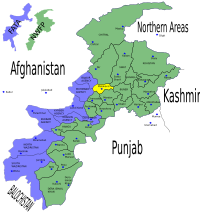Batkhela
|
Batkhela بټ خيله |
|
|---|---|
| City | |
| Tahsil Batkhela (Malakand District) | |
 Location of Malakand District (highlighted in yellow) within the Khyber Pakhtunkhwa of Pakistan. |
|
| Country |
|
| Province | Khyber Pakhtunkhwa |
| District | Malakand |
| Capital/Tehsil | Batkhela |
| Established | March 1895 (British) |
| Government | |
| • Type | Tehsil, City |
| • Governing body | Union Council (3 Seats) |
| • Tehsil Nazim | Fazal Wahid Lalagi (JI) |
| • District Member Lower Batkhela | Amjad Ali (JI) |
| • Middle Batkhela | Nasir Khan (PTI) |
| • Upper Batkhela | Saddam Hussain (Independent) |
| Area | |
| • City | 1,001 km2 (386 sq mi) |
| Population (1998 est.) | |
| • Urban | 38 222 |
| Time zone | PST (UTC+5) |
| Website | nwfp.gov.pk |
Coordinates: 34°37′N 71°58′E / 34.62°N 71.97°E
Batkhela (Pashto: بټ خيله, Urdu: بٹ خیلہ) is the main tehsil, city and capital of Malakand District, Khyber Pakhtunkhwa, Pakistan. According to the 1998 census, the population of Batkhela is 38,222, and it is estimated to be 39,703 according to the World Gazetteer. Batkhela is a popular business city in Khyber Pakhtunkhwa province. One water canal that pours into a small dam in Jaban area is main source of electricity production.
Batkhela General Civil Headquarters Hospital is main hospital of the district Malakand. Batkhela main bazaar is more than 2 kilometres long; there are no intersections (junctions) so no traffic lights. Therefore, it is the longest bazaar in Pakistan also in Asia that has no traffic lights or junctions (intersections) on it.
During the Ashoka and Kanishka Empires Batkhela was ruled by a leader named Butt hence city has given the name Batkhela.
When Mahmud of Ghazni (997-1030) was attacking India against the Hindus, during this time one of his army leader Pir Khushal assailed Batkhela, during the course of this assault most of his soldiers were sunk in big marsh at a place called Ghelai in Batkhela. However, soldiers of his army that survived have preferred to stay in this region. They have not only changed the culture and customs of the local inhabitants but also exert a strong influence on them to make them convert to the religion of Islam.
...
Wikipedia
